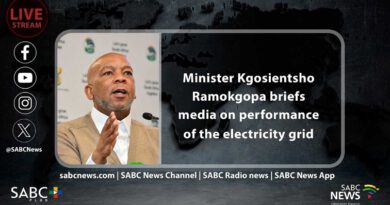No matter the label, SA has little tolerance for tax hikes
The South African economy and certainly the tax-paying community have little tolerance for further tax increases. Government acknowledged this much during the mini-budget in October last year.
Finance Minister Tito Mboweni and his team are burning the midnight oil to find solutions to keep the debt wolf at bay and to find money to keep SA Inc’s doors open. He will be delivering the 2021 budget later this month.
The pandemic hit the country while its economy was already limping, exacerbating the economic contraction, causing millions of job losses and creating an urgent need to have at least 67-70% of the population vaccinated against the coronavirus for it to loosen its grip on the country.
One of the options to pay for the vaccinations and get the economy going again has been a dedicated tax – wealth or vaccination tax – or a general tax increase.
David French, tax director at Mazars, says South Africa’s Laffer curve has reached the point where despite an increase in tax rates, the country is collecting less in tax.
The Laffer curve illustrates the relationship between tax rates and the amount of tax revenue collected by governments.
Tax experts says a once-off ‘Solidarity Tax’ could work if it was simple to calculate and administer, but strongly advise against it.
Robyn Berger, partner at Bowmans, says it has been easy to target the same people who regularly pay their fair share.
“We are experiencing a massive outflow of skills, and emigration remains high. People with wealth [who are being targeted for the wealth/vaccination/solidarity tax] have the ability to choose where they want to live – even in a Covid-19 environment,” she notes.
The options
Keith Engel, CEO of the South African Institute of Tax Professionals, says people are economically “tapped out”.
“It does not matter how you label this tax, if we are tapped out we are tapped out.”
Everybody, even up to “upper middle class” and “lower wealthy class”, is far worse off than a year ago. People are feeling the pinch because their income has declined and inflation is higher than expected (around 3.3%).
Engel says it is simply not economically viable to tax any more. Until Mboweni delivers his budget all options remain on the table. “I think it leaves either reprioritising existing funds or borrowing more. At the end of the day I think government is going to borrow more”.
The cost for the vaccination is touted to be around R20 billion.
Bernard Sachs, tax partner at Mazars, says the numbers are not as scary as government is making them out to be.
He explains that more than around 19 million people might be covered by medical aid schemes, and the Solidarity Fund has committed itself to the vaccination of 10% of the population (around six million).
In order to achieve so-called herd immunity one needs to vaccinate approximately 67% to 70% of the population, which means that around 42 million people have to be vaccinated.
That leaves around 17 million people (42 – 19 – 6 = 17) for government to concern itself with.
“I think government should not be making such a hoo-ha about the cost of the vaccines,” says Sachs. “It should just get on with the business of reallocating the funds in order to vaccinate the population and to allow the country to get a sense of normality back.”
Plug the leakage
The revenue shortfall has been estimated at around R304 billion, although there are signs that it may be slightly smaller than expected.
The alcohol and tobacco bans have certainly knocked collections real hard, says Sachs.
Government has been losing R1.25 billion per month on customs and excise duties on cigarettes during the ban, and double that on alcohol.
According to Sachs 40% of the local cigarette market is made up of illicit products. The excise duty on a packet of cigarettes is R16.66 and the value-added tax is around R5.
“There is significant leakage taking place. Government needs to plug that leakage. It could be paying for a lot of vaccinations.”
Second wave impact
The impact of the second wave on collections is not yet known. During the first lockdown periods, many companies still had some reserves to pull themselves through, says Berger.
“However, very few have any reserves left, especially in the hospitality industry … Businesses that may have survived may be forced to close due to the second wave and the lockdown measures implemented.”
This mean there will be fewer taxpayers, says Berger.
Mike Teuchert, national head of taxation at Mazars, refers to concerning statistics issued by Statistics South Africa. According to the figures, 67% of construction companies temporarily ceased trading during the Covid- 19 period, 60% in trade, 54% in agriculture, hunting, forestry and fishing, 47% in community, social and personal services, 44% in electricity, gas and water supply, and 38% in manufacturing.
He says the biggest challenge is to nurse these companies to ensure they have the ability to get back into the economy and to create jobs again.
Glimmer of hope
French notes that there is some light at the end of the tunnel. Actual revenue collections in December were up 6% (R10 billion) on the previous year. The collection figures came in at the highest level ever. It is completely counterintuitive, he says.
Despite the lack of economic activity, inflation is around 3.3%. Along with the December collection numbers it appears that there is an underlying robustness in the economy that we have not anticipated.
“I cannot put my finger on it, but it does make me a little bit more optimistic,” says French.
Source: moneyweb.co.za



